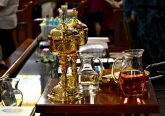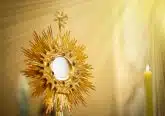Everything you need to know about the National Eucharistic Congress
Baltimore, Md., Nov 17, 2021 / 16:20 pm
Seeking to rekindle devotion to the Eucharist, the United States Conference of Catholic Bishops voted Nov. 17 to launch an ambitious, three-year revival initiative, culminating with a National Eucharistic Congress in Indianapolis in 2024.
“My sense, from speaking with you, is that the Holy Spirit is leading us together to fulfill a great need for the Church,” Bishop-designate Andrew H. Cozzens of Crookston, Minn., one of the architects of the multi-faceted campaign, said Wednesday during the USCCB’s annual fall assembly in Baltimore.
The revival initiative will include the development of new teaching materials, training for diocesan and parish leaders, the launch of a dedicated revival website, and the deployment of a special team of 50 priests who will travel the country to preach about the Eucharist.
The campaign will officially launch on June 19, 2022 on the feast of Corpus Christi. Dioceses will be encouraged to hold Eucharistic processions on that day, Cozzens said. He said Blessed Carlo Acutis, the young Italian Catholic who used his computer skills to share online content about Eucharistic miracles, will be the patron of the revival’s first year.
Perhaps the revival’s most ambitious component is a National Eucharistic Congress planned for July 17-21, 2024 in Indianapolis, Cozzens announced Wednesday. In an interview with CNA, Cozzens said the congress would be the first of its kind in the United States in nearly 50 years. He told the bishops during his presentation that the last large U.S. Eucharistic congress took place in Philadelphia in 1976. Previously, Cozzens said, such national eucharistic events were held once a decade.
The bishops voted 201 to 17 in favor of the revival campaign, with five abstentions. The voting was anonymous and conducted electronically.
“I am very hopeful that it will produce the great fruits that all my brother bishops are praying for and hoping for during these days, including helping people in the course of the revival to rediscover the beauty of the Mass and return to Mass,” Bishop James D. Conley of Lincoln, Neb., said prior to the vote.
“I think we’re on the cusp and on the verge of something truly impactful and wonderful for the Church in the United States,” Conley said. “I think this might be just what we need.”
“Let the revival begin, brothers,” Cozzens said after the vote.
Currently an auxiliary bishop in the Archdiocese of Saint Paul and Minneapolis, Cozzens serves as chairman of the USCCB’s Committee on Evangelization and Catechesis. In an interview with CNA, he said the initiative is a comprehensive effort to spark a greater love and devotion to the Eucharist.
“Our goal is to lead people to a deeper encounter with Jesus Christ in the Eucharist so that their lives can be transformed,” Cozzens said.
“And the reason it’s three years is because we want to affect the Church at every level,” with different initiatives geared for parishes, dioceses, and the country as a whole, he said.
“We want the depth. We don’t just want to have a couple of nice celebrations that say the Eucharist is great,” Cozzens told CNA.
“The bishops are asking for a deep and sustained focus on the Eucharist. And my hope is that … this will become a long-lasting movement,” Cozzens said.
Other highlights of the revival plan include the following:
- The distribution of a “how-to” handbook to diocesan leaders in December.
- The launch of a dedicated website, EucharisticRevival.org, expected in January, providing a wealth of catechetical resources in both English and Spanish, including the new document on the Eucharist the bishops approved Nov. 17. Cozzens said the website is being funded by FORMED, an online provider of Catholic faith formation resources, amounting to an in-kind gift of $1.2 million.
- The commission of a new study on Catholic belief in the Eucharist by the Center for Applied Research in the Apostolate (CARA) at Georgetown University. Cozzens said the study will be funded by the McGrath Institute for Church Life at the University of Notre Dame. The new study stems in part from concerns among U.S. Catholic leaders about the validity of a widely referenced Pew Research Center survey in 2019 that found that just one-third of U.S. Catholics agree that the Eucharist is the body and blood of Jesus Christ.
- The development of a national advertising campaign about the revival effort, funded by a grant from the Knights of Columbus. The Knights of Columbus is also partnering with the USCCB to provide dioceses with a “tool kit” for holding Corpus Christi processions.
During the discussion about the revival initiative Wednesday, Archbishop Timothy P. Broglio of the Archdiocese for the Military Services, USA, said that while he supported the idea of holding a Eucharistic Congress, he questions the estimated $28 million cost associated with holding the event, which Cozzens said he hopes can draw between 80,000 and 100,000 people to Indianapolis.
“I think this is a wonderful proposal. I’m a little concerned, though, and I’ve mentioned this to you once before, the $28 million price tag on this gathering, I think, might appear to be a bit scandalous, if you think about all of the things that the Church needs and asks money for.”
“We’re talking about a lot of people, that’s the real issue,” Cozzens responded. “That’s why it costs so much. I do think the spiritual fruits of the event will be worth the investment.”













